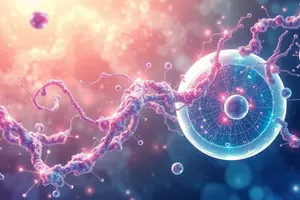Podcast
Questions and Answers
What is the primary focus of pharmacodynamics?
What is the primary focus of pharmacodynamics?
- The effect of drugs on the body (correct)
- The physical properties of drugs
- The study of drug formulation
- The synthesis of new drug molecules
Pharmaceutics involves the study of drug design to optimize pharmacokinetics and pharmacodynamics.
Pharmaceutics involves the study of drug design to optimize pharmacokinetics and pharmacodynamics.
False (B)
Define biopharmaceutics.
Define biopharmaceutics.
The study of the physical and chemical properties of drugs and their proper dosage related to drug action.
The design of drug formulation for optimum delivery and stability is known as __________.
The design of drug formulation for optimum delivery and stability is known as __________.
Match the following terms with their correct definitions:
Match the following terms with their correct definitions:
What does pharmacodynamics primarily study?
What does pharmacodynamics primarily study?
Pharmacokinetics refers to the study of the harmful effects of drugs.
Pharmacokinetics refers to the study of the harmful effects of drugs.
What is pharmacogenomics?
What is pharmacogenomics?
Pharmaceutical __________ is the study of the harmful or toxic effects of drugs.
Pharmaceutical __________ is the study of the harmful or toxic effects of drugs.
Match the pharmaceutical terms with their definitions:
Match the pharmaceutical terms with their definitions:
Flashcards are hidden until you start studying
Study Notes
Pharmacodynamics
- Investigates how drugs bind to receptors, considering the concentration and time required for a response.
- Analyzes the effect of drugs on the body and their interactions at receptor sites.
Pharmaceutical Chemistry
- Focuses on the synthesis of new drug molecules and the design of drugs aimed at optimizing pharmacokinetics (absorption, distribution, metabolism, excretion) and pharmacodynamics.
- Involves the study of molecular structures and their implications on drug effectiveness.
Pharmaceutics
- Centers on the design and formulation of drugs for optimal delivery to patients.
- Ensures stability, pharmacokinetics, and patient acceptance by studying various dosage forms.
Biopharmaceutics
- Examines the physical and chemical properties of drugs, as well as the appropriate dosages related to onset, duration, and intensity of therapeutic effects.
- Considers factors affecting drug action timing and effectiveness.
Pharmaceutical Equivalents
- Drug products are considered pharmaceutical equivalents when they share the same active ingredient(s), dosage form, route of administration, and strength or concentration.
- Examples include identical formulations like capsules or syrups with similar effectiveness.
Pharmacogenomics
- Studies the genetic patterns affecting interactions between drugs and organisms.
- Influences personalized medicine by tailoring drug therapy based on genetic profiles.
Pharmaceutical Toxicology
- Investigates the harmful or toxic effects of drugs on organisms.
- Aims to understand adverse reactions and the safety profiles of pharmaceutical compounds.
Pharmacokinetics
- Describes the science of absorption, distribution, metabolism, and elimination (ADME) of drugs.
- Focuses on the time required for each parameter to impact drug efficacy within the body.
Drug Interactions with Receptors
- Explores how drugs interact with their specific receptors over time and the resulting physiological effects.
- Involves monitoring and studying drug responses at the receptor level.
Antagonists
- Defined as drugs that bind to receptors but prevent activation by endogenous substances.
- Example: Naloxone is an opioid antagonist that blocks receptor activation, used in opioid overdose cases.
Studying That Suits You
Use AI to generate personalized quizzes and flashcards to suit your learning preferences.




